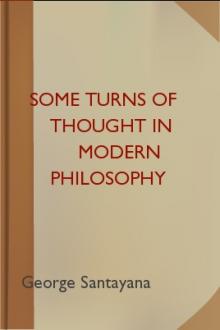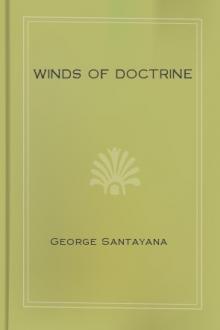Some Turns of Thought in Modern Philosophy, George Santayana [if you liked this book .TXT] 📗

- Author: George Santayana
- Performer: -
Book online «Some Turns of Thought in Modern Philosophy, George Santayana [if you liked this book .TXT] 📗». Author George Santayana
This revolution in science seems, then, to be perfectly legal, and ought to be welcomed; yet only under one important moral condition, and with a paradoxical result. The moral condition is that the pride of science should turn into humility, that it should no longer imagine that it is laying bare the intrinsic nature of things. And the paradoxical result is this: that the forms of science are optional, like various languages or methods of notation. One may be more convenient or subtle than another, according to the place, senses, interests, and scope of the explorer; a reform in science may render the old theories antiquated, like the habit of wearing togas, or of going naked; but it cannot render them false, or itself true. Science, when it is more than the gossip of adventure or of experiment, yields practical assurances couched in symbolic terms, but no ultimate insight: so that the intellectual vacancy of the expert, which I was deriding, is a sort of warrant of his solidity. It is rather when the expert prophesies, when he propounds a new philosophy founded on his latest experiments, that we may justly smile at his system, and wait for the next.
Self-knowledge—and the new science is full of self-knowledge—is a great liberator: if perhaps it imposes some retrenchment, essentially it revives courage. Then at last we see what we are and what we can do. The spirit can abandon its vain commitments and false pretensions, like a young man free at last to throw off his clothes and run naked along the sands. Intelligence is never gayer, never surer, than when it is strictly formal, satisfied with the evidence of its materials, as with the lights of jewels, and filled with mounting speculations, as with a sort of laughter. If all the arts aspire to the condition of music, all the sciences aspire to the condition of mathematics. Their logic is their spontaneous and intelligible side: and while they differ from mathematics and from one another in being directed in the first instance upon various unintelligible existing objects, yet as they advance, they unite: because they are everywhere striving to discover in those miscellaneous objects some intelligible order and method. And as the emotion of the pure artist, whatever may be his materials, lies in finding in them some formal harmony or imposing it upon them, so the interest of the scientific mind, in so far as it is free and purely intellectual, lies in tracing their formal pattern. The mathematician can afford to leave to his clients, the engineers, or perhaps the popular philosophers, the emotion of belief: for himself he keeps the lyrical pleasure of metre and of evolving equations: and it is a pleasant surprise to him, and an added problem, if he finds that the arts can use his calculations, or that the senses can verify them; much as if a composer found that the sailors could heave better when singing his songs.
Yet such independence, however glorious inwardly, cannot help diminishing the prestige of the arts in the world. If science misled us before, when it was full of clearness and confidence, how shall we trust it now that it is all mystery and paradox? If classical physics needed this fundamental revision, near to experience and fruitful as it was, what revision will not romantic physics require? Nor is the future alone insecure: even now the prophets hardly understand one another, or perhaps themselves; and some of them interlard their science with the most dubious metaphysics. Naturally the enemies of science have not been slow to seize this opportunity: the soft-hearted, the muddle-headed, the superstitious are all raising their voices, no longer in desperate resistance to science, but hopefully, and in its name. Science, they tell us, is no longer hostile to religion, or to divination of any sort. Indeed, divination is a science too. Physics is no longer materialistic since space is now curved, and filled with an ether through which light travels at 300,000 kilometres per second—an immaterial rate: because if anything material ventured to move at that forbidden speed, it would be so flattened that it would cease to exist. Indeed, matter is now hardly needed at all; its place has been taken by radio-activity, and by electrons which dart and whirl with such miraculous swiftness, that occasionally, for no known reason, they can skip from orbit to orbit without traversing the intervening positions—an evident proof of free-will in them. Or if solids should still seem to be material, there are astral bodies as well which are immaterial although physical; and as to ether and electricity, they are the very substance of spirit. All this I find announced in newspapers and even in books as the breakdown of scientific materialism: and yet, when was materialism more arrant and barbarous than in these announcements? Something no doubt has broken down: but I am afraid it is rather the habit of thinking clearly and the power to discern the difference between material and spiritual things.
The latest revolution in science will probably not be the last. I do not know what internal difficulties, contradictions, or ominous obscurities may exist in the new theories, or what logical seeds of change, perhaps of radical change, might be discovered there by a competent critic. I base my expectation on two circumstances somewhat more external and visible to the lay mind. One circumstance is that the new theories seem to be affected, and partly inspired, by a particular philosophy, itself utterly insecure. This philosophy regards the point of view as controlling or even creating the object seen; in other words, it identifies the object with the experience or the knowledge of it: it is essentially a subjective, psychological, Protestant philosophy. The study of perspectives, which a severer critic might call illusions, is one of the most interesting and enlightening of studies, and for my own part I should be content to dwell almost exclusively in that poetic and moral atmosphere, in the realm of literature and of humanism. Yet I cannot help seeing that neither in logic nor in natural genesis can perspectives be the ultimate object of science, since a plurality of points of view, somehow comparable, must be assumed in the beginning, as well as common principles of projection, and ulterior points of contact or coincidence. Such assumptions, which must persist throughout, seem to presuppose an absolute system of nature behind all the relative systems of science.
The other circumstance which points to further revolutions is social. The new science is unintelligible to almost all of us; it can be tested only by very delicate observations and very difficult reasoning. We accept it on the authority of a few professors who themselves have accepted it with a contagious alacrity, as if caught in a whirlwind. It has sprung up mysteriously and mightily, like mysticism in a cloister or theology in a council: a Soviet of learned men has proclaimed it. Moreover, it is not merely a system among systems, but a movement among movements. A system, even when it has serious rivals, may be maintained for centuries as religions are maintained, institutionally; but a movement comes to an end; it is followed presently by a period of assimilation which transforms it, or by a movement in some other direction. I ask myself accordingly whether the condition of the world in the coming years will be favourable to refined and paradoxical science. The extension of education will have enabled the uneducated to pronounce upon everything. Will the patronage of capital and enterprise subsist, to encourage discovery and reward invention? Will a jealous and dogmatic democracy respect the unintelligible insight of the few? Will a perhaps starving democracy support materially its Soviet of seers? But let us suppose that no utilitarian fanaticism supervenes, and no intellectual surfeit or discouragement. May not the very profundity of the new science and its metaphysical affinities lead it to bolder developments, inscrutable to the public and incompatible with one another, like the gnostic sects of declining antiquity? Then perhaps that luminous modern thing which until recently was called science, in contrast to all personal philosophies, may cease to exist altogether, being petrified into routine in the practitioners, and fading in the professors into abstruse speculations.
IV A LONG WAY ROUND TO NIRVANAThat the end of life is death may be called a truism, since the various kinds of immortality that might perhaps supervene would none of them abolish death, but at best would weave life and death together into the texture of a more comprehensive destiny. The end of one life might be the beginning of another, if the Creator had composed his great work like a dramatic poet, assigning successive lines to different characters. Death would then be merely the cue at the end of each speech, summoning the next personage to break in and keep the ball rolling. Or perhaps, as some suppose, all the characters are assumed in turn by a single supernatural Spirit, who amid his endless improvisations is imagining himself living for the moment in this particular solar and social system. Death in such a universal monologue would be but a change of scene or of metre, while in the scramble of a real comedy it would be a change of actors. In either case every voice would be silenced sooner or later, and death would end each particular life, in spite of all possible sequels.
The relapse of created things into nothing is no violent fatality, but something naturally quite smooth and proper. This has been set forth recently, in a novel way, by a philosopher from whom we hardly expected such a lesson, namely Professor Sigmund Freud. He has now broadened his conception of sexual craving or libido into a general principle of attraction or concretion in matter, like the Eros of the ancient poets Hesiod and Empedocles. The windows of that stuffy clinic have been thrown open; that smell of acrid disinfectants, those hysterical shrieks, have escaped into the cold night. The troubles of the sick soul, we are given to understand, as well as their cure, after all flow from the stars.
I am glad that Freud has resisted the tendency to represent this principle of Love as the only principle in nature. Unity somehow exercises an evil spell over metaphysicians. It is admitted that in real life it is not well for One to be alone, and I think pure unity is no less barren and graceless in metaphysics. You must have plurality to start with, or trinity, or at least duality, if you wish to get anywhere, even if you wish to get effectively into the bosom of the One, abandoning your separate existence. Freud, like Empedocles, has prudently introduced a prior principle for Love to play with; not Strife, however (which is only an incident in Love), but Inertia, or the tendency towards peace and death. Let us suppose that matter was originally dead, and perfectly content to be so, and that it still relapses, when it can, into its old equilibrium. But the homogeneous (as Spencer would say) when it is finite is unstable: and matter, presumably not being co-extensive with space, necessarily forms aggregates which have an inside and an outside. The parts of such bodies are accordingly differently exposed to external influences and differently related to one another. This inequality, even in what seems most quiescent, is big with changes, destined to produce in time a wonderful complexity. It is the source of all uneasiness,





Comments (0)